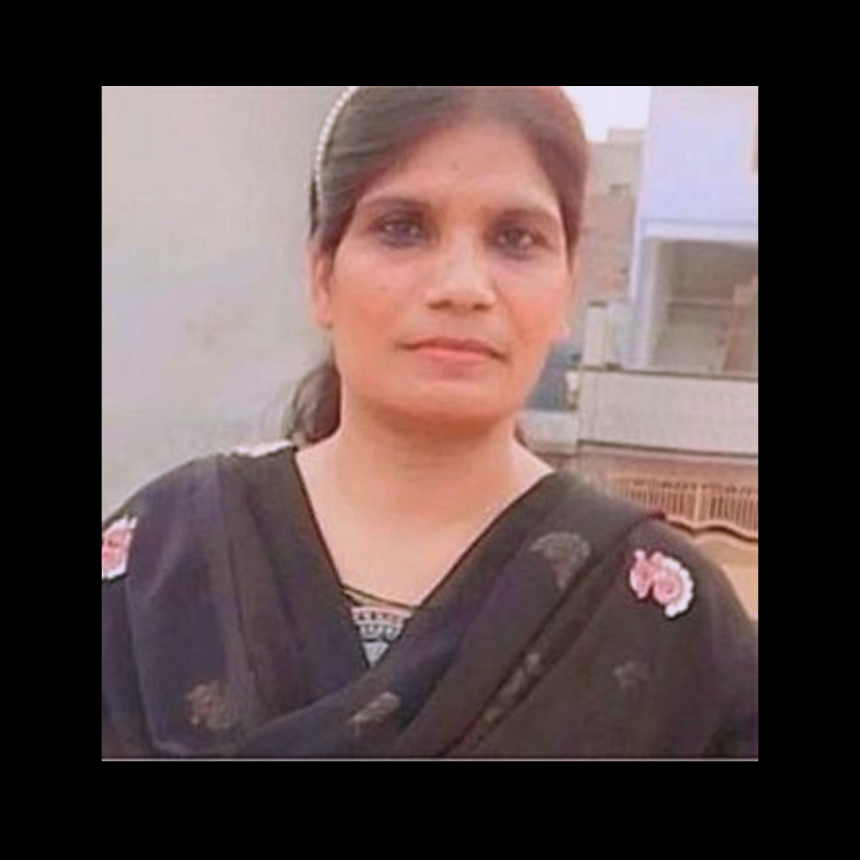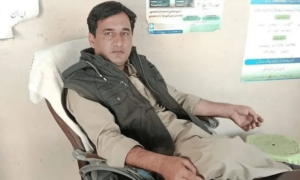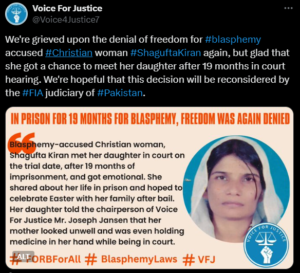“Christian Mother Sentenced to Death Under Blasphemy Laws Amid Rising Religious Tensions in Pakistan”

Shagufta Kiran, a Christian mother of four, was sentenced to death on Wednesday, September 18, after being convicted under Pakistan’s blasphemy laws. Her lawyer, Rana Abdul Hameed, confirmed that she was found guilty under Sections 295 A, B, and C, Section 298, and Section 11 of the PECA laws. Additional Sessions Judge Muhammad Afzal Majoka of Islamabad also imposed a fine of Rs300,000 after a three-year trial.
According to Tariq Mehmood Ghauri from the National Commission for Justice and Peace (NCJP), the organization had been advocating for Kiran’s release since her arrest three years ago in Rawalpindi. Ghauri, who worked on her case, explained that Kiran, previously employed as a nurse, had been interested in learning about other religions. She was arrested after a dispute in a WhatsApp group about the Islamic marriage age led to a complaint filed against her by someone from the group. The FIA arrested her on July 29, 2021, for allegedly sharing blasphemous content in September 2020. She was accused of insulting Prophet Muhammad (PBUH).
Kiran had participated in several interfaith WhatsApp groups where she discussed her Christian beliefs and shared Gospel teachings. One group, “Pure Discussions,” moderated by Muslim administrators from Pakistan, India, and Canada, became the source of the controversy. Farooqi, one of the administrators, accused Kiran of sharing blasphemous content. However, Kiran maintained that she had forwarded the content without fully reading it and was not the author.
Her husband and two sons, who were initially detained during the arrest, were later released. Abdul Hameed expressed optimism about her appeal to the Islamabad High Court, noting that the case has potential for acquittal. He highlighted the pressures faced by lower courts in blasphemy cases, where trial courts often convict based on weak evidence due to fear of religious groups and mob violence. However, he emphasized that superior courts frequently overturn such convictions.
Kiran’s case has drawn the support of NGOs, including the Jubilee Campaign and Voice for Justice Campaign, which are advocating for her release. Hameed said that Kiran has been struggling with severe emotional distress, having been separated from her children for the past three years due to the charges.

Recent incidents highlight the ongoing challenges related to blasphemy accusations in Pakistan. Just a day before Kiran’s sentencing, Dr. Shahnawaz Kambhar, accused of blasphemy in Umerkot, was killed by a police officer. Despite the lack of evidence, a mob later seized his body and set it on fire. Similarly, the Jaranwala incident marked its first anniversary in August 2024, when 21 churches were burned, and over 80 Christian homes were destroyed following allegations of blasphemy against two residents. Most of the suspects in that case were either acquitted or remain at large.
According to the Center for Social Justice (CSJ), nearly 3,000 people have been accused of blasphemy in Pakistan since 1987, and hundreds remain incarcerated, particularly in Punjab. Between January and June 2024 alone, 103 new blasphemy accusations were recorded.

The Human Rights Commission of Pakistan (HRCP) has expressed grave concern over recent extrajudicial killings of individuals accused of blasphemy, including a hotel owner in Quetta and Dr. Kambhar in Umerkot. The HRCP called for an independent inquiry and accountability for these deaths, emphasizing the need to address rising radicalization in the country.
The Joint Action Committee has also condemned the misuse of blasphemy laws and called for a national campaign to prevent further abuse. In another recent incident, a 22-year-old English teacher, Abdul Rauf, was killed in Turbat after being accused of blasphemy by students during one of his lectures. His case gained significant attention on social media, further escalating tensions.





